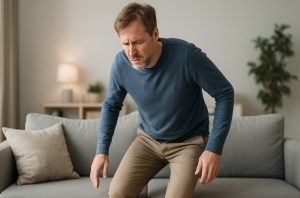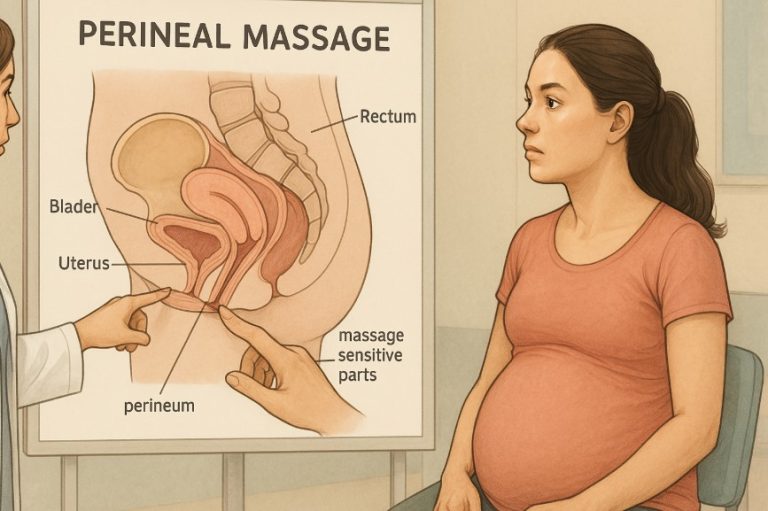Many people have experienced that unsettling moment of standing up from a chair or bed only to feel their head spin or their vision blur. The sensation can range from a fleeting light-headedness to a stronger wave of dizziness that makes you feel unsteady or even faint. But why does this happen, and when should it be a cause for concern?
The explanation often lies in how the body controls blood pressure and blood flow to the brain. In most cases, dizziness when standing is linked to orthostatic hypotension, a sudden drop in blood pressure triggered by position changes.
However, there are also less common causes, including postural tachycardia syndrome (PoTS), inner ear problems such as benign paroxysmal positional vertigo (BPPV), and even certain neurological conditions. Understanding these possibilities is key to managing the symptoms and knowing when medical advice is necessary.
Why Does Dizziness Happen When You Stand Up?

When a person moves from sitting or lying down to standing, gravity pulls blood towards the lower half of the body, especially the legs. Normally, the body compensates for this shift almost instantly.
The heart beats slightly faster, and blood vessels narrow to keep blood pressure stable and maintain adequate blood flow to the brain.
If this compensation is delayed, too weak, or fails altogether, blood pressure drops temporarily. This means that less oxygen-rich blood reaches the brain, causing sensations of dizziness, light-headedness, or blurred vision. This condition is widely known as orthostatic hypotension or postural hypotension.
In healthy individuals, such episodes may be occasional and mild, but when they become frequent or severe, they signal an underlying issue that requires closer attention.
What Are the Most Common Causes of Dizziness on Standing?
Dehydration
A lack of fluids in the body reduces overall blood volume. Without enough circulating blood, it becomes harder to maintain steady blood pressure during position changes. This is why people who are dehydrated often report dizziness, especially when rising quickly.
Medications
Many prescribed medications can influence blood pressure. Drugs used for high blood pressure, depression, erectile dysfunction, or neurological disorders can sometimes lower blood pressure too much, causing dizziness as an unintended side effect.
Medical Conditions
Several health conditions may contribute to dizziness on standing. Anaemia, for example, lowers the oxygen-carrying capacity of the blood, making it harder for the brain to get sufficient oxygen during sudden position changes.
Pregnancy can also play a role, as blood circulation shifts to support both the mother and the developing baby. Other conditions affecting the heart or nervous system may also disrupt the delicate balance needed to maintain blood pressure.
Could Less Common Conditions Cause Dizziness When Standing?
Postural Tachycardia Syndrome (PoTS)
PoTS is a condition where the heart rate rises abnormally fast after standing up, sometimes by more than 30 beats per minute.
Unlike orthostatic hypotension, blood pressure does not necessarily fall, but the rapid change in heart rate can still cause dizziness, palpitations, and fatigue.
Inner Ear Disorders
Balance is closely linked to the inner ear. Problems such as benign paroxysmal positional vertigo (BPPV) can create dizziness or spinning sensations when a person changes position, including standing up.
These conditions are not linked to blood pressure but rather to the way the ear sends signals to the brain about movement and balance.
Nervous System Disorders
Neurological conditions that affect the autonomic nervous system may also interfere with how the body adjusts blood pressure and heart rate.
Disorders such as Parkinson’s disease or diabetic autonomic neuropathy can make dizziness on standing more likely and more severe.
How Do Common and Less Common Causes Compare?
| Cause | Mechanism | Typical Symptoms | Frequency |
| Orthostatic Hypotension | Drop in blood pressure on standing | Light-headedness, fainting, blurred vision | Common |
| Dehydration | Low blood volume reduces circulation | Dizziness, weakness, dry mouth | Common |
| Anaemia | Reduced oxygen delivery to brain | Fatigue, pale skin, dizziness | Common |
| Medications | Side effects reduce blood pressure | Light-headedness, fatigue | Common |
| Postural Tachycardia Syndrome | Rapid increase in heart rate after standing | Palpitations, dizziness, fatigue | Less common |
| Inner Ear Disorders (BPPV) | Balance disruption due to inner ear crystals | Spinning sensation, dizziness | Less common |
| Nervous System Disorders | Faulty regulation of blood pressure | Dizziness, fainting, neurological signs | Less common |
When Should You See a Doctor About Dizziness on Standing?

Occasional dizziness is not unusual, but persistent or severe symptoms should not be dismissed. It is important to consult a healthcare professional if:
- Dizziness occurs frequently or worsens over time
- Episodes are accompanied by fainting or near fainting
- Chest pain, shortness of breath, or palpitations occur
- There are additional neurological symptoms such as difficulty speaking or problems with coordination
Doctors can help identify the underlying cause and recommend suitable strategies. Sometimes, this may involve adjusting medications, recommending dietary changes, or investigating underlying health conditions.
How Can You Reduce or Prevent Dizziness When Standing Up?
For many people, lifestyle strategies can significantly reduce symptoms. Drinking sufficient fluids throughout the day is one of the most effective methods, especially in preventing dehydration-related dizziness.
Rising slowly from sitting or lying positions allows the body more time to adjust, reducing the likelihood of a sudden drop in blood pressure.
Small, frequent meals can help prevent fluctuations in blood sugar levels, which may otherwise contribute to dizziness.
Some individuals benefit from wearing compression stockings, which reduce blood pooling in the legs. Limiting alcohol intake, maintaining a healthy diet rich in iron, and engaging in regular physical activity can also strengthen circulation and overall cardiovascular health.
How Do Doctors Diagnose and Treat Dizziness When Standing?

A GP will usually begin by taking a detailed history of symptoms, including when they occur, how long they last, and whether they are accompanied by other issues such as fainting or palpitations.
Physical examinations may involve checking blood pressure while lying down, sitting, and standing.
Additional tests may include a tilt table test to evaluate how the body responds to changes in position, as well as blood tests to identify anaemia, thyroid disorders, or other medical conditions.
Treatment depends entirely on the cause. For some people, simple lifestyle changes such as improving hydration or standing more slowly are enough. For others, adjusting or changing medication may be necessary.
In more complex cases, treatment may involve specific drugs to support blood pressure regulation or therapies to manage underlying conditions such as PoTS or inner ear disorders.
Should You Be Concerned About Dizziness on Standing?
Dizziness when standing is often temporary and harmless, but it should not be overlooked if it becomes frequent, severe, or disruptive. Most cases can be linked to manageable causes such as dehydration or side effects from medication.
However, dizziness can also be a sign of more complex conditions, including cardiovascular or neurological disorders, that require professional attention.
Taking note of when dizziness happens, how long it lasts, and what seems to trigger it can provide valuable information for a doctor.
With the right evaluation and treatment, most people can reduce or even eliminate symptoms, restoring both comfort and confidence in daily life.
FAQs
Can stress cause dizziness when standing?
Yes. Stress and anxiety can increase heart rate and change breathing patterns, which sometimes makes people feel dizzy.
Is dizziness always caused by low blood pressure?
No. While orthostatic hypotension is common, dizziness can also result from PoTS, inner ear problems, or neurological issues.
How does PoTS differ from orthostatic hypotension?
In orthostatic hypotension, blood pressure drops when standing. In PoTS, blood pressure may remain steady, but the heart rate rises significantly.
Can pregnancy lead to dizziness when standing?
Yes. Hormonal changes and the increased demand for blood supply during pregnancy can trigger dizziness.
Does diet play a role in preventing dizziness?
Yes. Adequate hydration and foods rich in iron help support blood circulation and oxygen supply, reducing dizziness.
Are older adults more at risk of dizziness when standing?
Yes. Ageing makes it harder for the body to regulate blood pressure, and older adults often take medications that may contribute to dizziness.
What should I do if I faint after standing up?
Lie down straight away, elevate your legs if possible, and seek medical advice to rule out serious causes.
READ NEXT:






